10 Minutes With … Creative Licensing on Licensing Heritage Movie Franchises
License Global delves into the world of movies and with Rand Marlis, president, owner, Creative Licensing and looks at why IPs such as “Bill and Ted’s Excellent Adventure,” “Halloween,” “The Terminator,” “Escape from New York,” and “Rambo,” resonate so well with audiences when it comes to licensing.
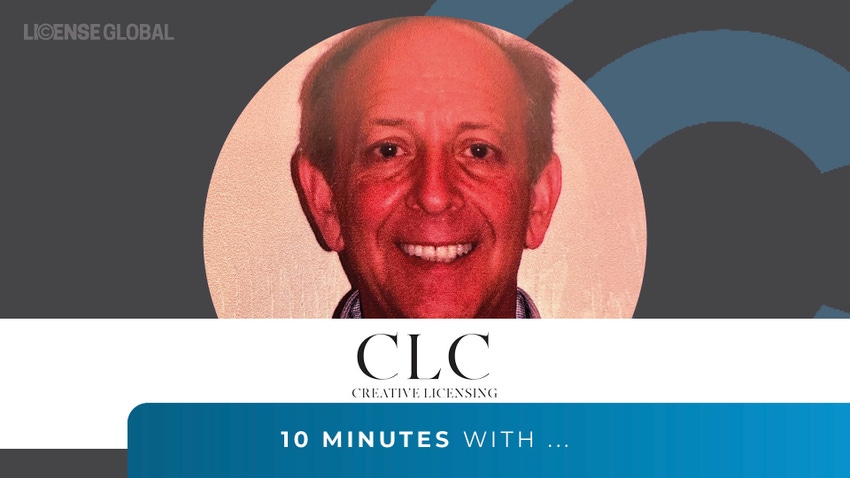
License Global: Can you talk a little about the studios you work with and how the process works when it comes to developing new consumer products for the IPs you represent?
Rand Marlis: Creative Licensing is a fairly large independent company. We have over 225 active licensees and our focus is on what we call ‘classic films,’ or well-known traditional IP.
We have a number of companies and producers that we work with, and all our representations are on a worldwide basis. We’ve been working with Studiocanal in Paris, France, for well over a decade. We also work with companies like Compass Films, which has the horror classic “Halloween;” Revolution Studios, which has about 25 or 35 different titles; Bold Films, which has “Drive” and a couple of newer films and Re-animator Films Production, which has the “Re-Animator” horror film.
We are responsible for all areas of licensing and we work as if we are a division of a major studio. We will go out and find the licensees, negotiate deals and submit it to the owners for approval. We'll do all of the paperwork and contracts. We will get the license signed, both by us and the owner. We will make sure that the art assets are available. We then do the product design review. We'll do accounting and assist if there are problems with either the licensee or the retailers.
We concentrate on classic films, as we don't have the resources to compete with Disney and Warner Bros. on new releases and, frankly, we don't want to. That’s not really our aim. We’ve found over years of doing this that the new releases are hit-and-miss. Some can sound good going in and don't perform some can perform and be wonderful for a couple of months and then it's yesterday's news. I’ll give you an example: It's very hard to think of what the biggest films of three years ago were. But it’s not hard to think about “Terminator,” “Rambo” and “Bill and Ted’s Excellent Adventure” and “Halloween,” because they’ve been around for so long and they have staying power.
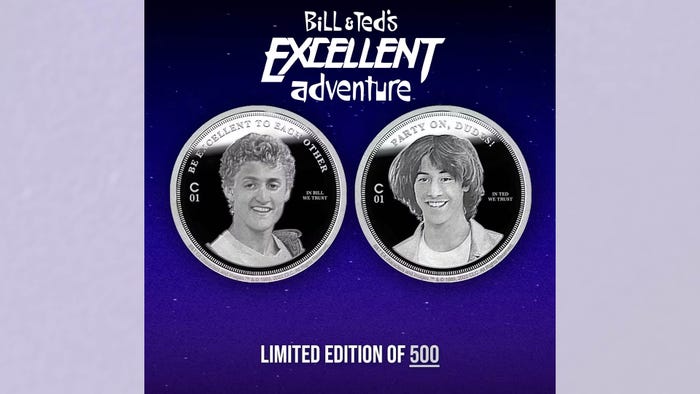
“Bill and Ted’s Excellent Adventure” silver coins, The Chive.
We deal with our licensees on a long-term basis. We don't need to worry about the release of an upcoming film that's going to be dependent upon having product in the marketplace to help promote the film. We can talk to licensees in multi-year strands, where it may take two or three years to develop a product, like our upcoming video games and arcade machines. We can plan out what we’re going to do in year one, year two and so on, because the IP is not going to change.
Are you seeing differing trends between consumers who have grown up with the IP since the original movies and fans who might be newer to the movies having watched more recently or found them through more recent franchise releases?
When it comes to the newer franchise sequels, we believe that the fandom wants what they remember, which is the original movie. We approach the sequels as additional publicity, but not as a licensing alternative. I'm a firm believer in the strength of the IP that we have, and I don't think it makes much sense to bastardize it by trying to, for instance, do something new that'll be appealing to a nine or a 19-year-old because we're tired of selling things that 29- and 39-year-olds like. Our core consumer-base knows our IP as it is familiar to them. We don’t feel the need to change the look of the character to meet consumer needs. We want to be faithful to the existing brands, what the brands represent and what the fandom remembers.
_Reef_Enterrainment.jpg?width=700&auto=webp&quality=80&disable=upscale)
“Terminator: Resistance” video game title card, Reef Enterrainment.
What is it about IPs like, “Halloween,” “Rambo,” “Evil Dead,” “The Terminator,” and so on, that are so appealing? What resonates best about them with audiences when it comes to licensed products?
I’d throw in “Bill and Ted’s Excellent Adventure” and “Escape from New York,” too and I think it’s because they are pure. You know what they are. They stand for something; they stand for a simpler time.
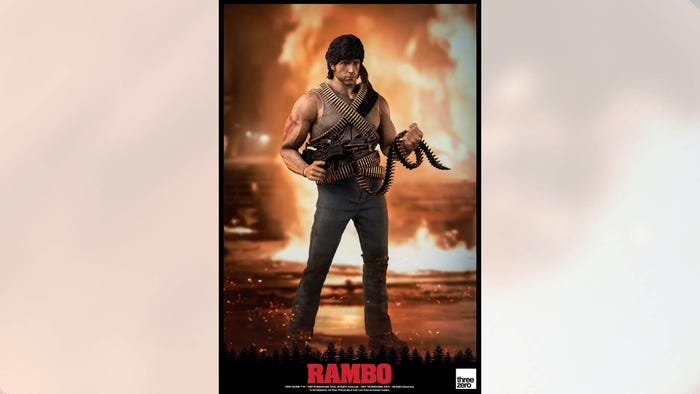
Rambo collectible figure, ThreeZero.
Some of these films are analog. They don't have massive digital compilations of things like some of the new Marvel films do. These films were made with a lot of love and a lot of care. The first “Terminator” film has no digital in it. It was all done in “real camera”’sort of look. The second one, “Terminator 2: Judgment Day,” introduced digital technology and is loved for that. I think that fans resonate with what they remember as being fun and something they enjoyed at the time, and the films hold upf you go back and watch them now. Nostalgia is a very important thing, and it makes us different from the new releases.
Nostalgia plays a big part in the fashion space, too. How does that manifest itself with some of your core IP?
Fashion for us is really T-shirts. We have huge success in that area for our apparel licensing, most prominently with “Halloween.” Our “Halloween”’ licenses are iconic and well known. We have good key art. So, while the key art the image doesn't change, some of the design around it will. For example, there is a famous picture of a pumpkin with a knife and another one of the evil character, Michael Myers, with a knife. Those may be done with an orange border or something, to make it look a lightly different on the outside. But the core IP is the same. For us, with apparel, it's branded unification.
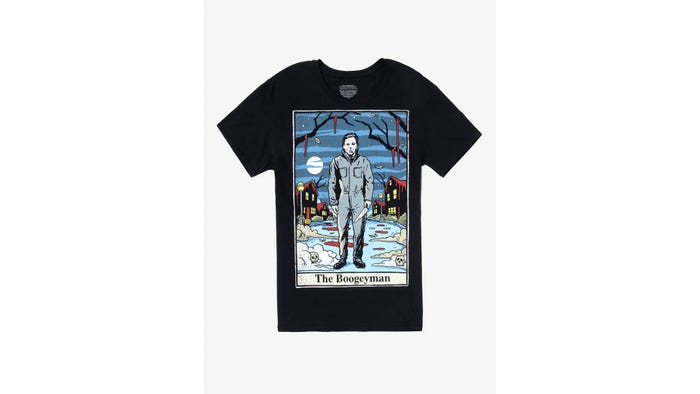
“Halloween” T-shirt, Bioworld.
What we really license, in many cases, are characters, not really the film itself. Some of the most wonderful films, Oscar winners, are not licensable because they don't have strong characters. We have Terminator, Rambo, Bill and Ted. All of them are characters that you know and can picture. It the characters that are licensable and that the fans really like.
That leads us to the area of collectibles, where we have things like action figures which are in the mid-$50s to $70 range, multi $1,000 collectibles figures, right up to a full-size standing “Terminator” endoskeleton robot, which retails at over $6,000. Those are things that the fans can aspire to and, we believe, give them a permanent association with the characters that they love.
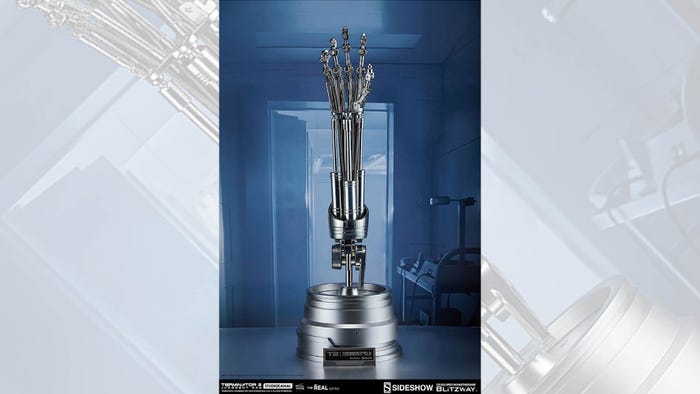
"Terminator 2 Judgment Day" Animatronic Endoskeleton Arm, Blitzway.
You spoke earlier about not tailoring your strategy around new releases, but do anniversaries play a part? “The Terminator” turns 40 next year, are there any plans around that milestone and what can we expect from your core IP over the next 12 to 24 months?
We are working with Studiocanal on 40th anniversary of “The Terminator,” but we're not disclosing at this time what the next steps will be. “Bill and Ted's Excellent Adventure” turns 35 next year, too, so we do have some nice anniversaries coming up. We find that anniversaries are helpful from a marketing perspective, though I’m not convinced that they are fundamental to the collectors or to the fans. The fans like to remember the brand and it doesn’t really matter to them when they first connect with that brand. As I said before, the more relevant thing is having a strong IP with good characters.
Creative Licensing will be showcasing many IPs, including “Bill and Ted’s Excellent Adventure,” “Halloween” (1978), “The Terminator,” “Terminator 2: Judgment Day,” “Escape from New York,” “Rambo” and “Evil Dead II” at booth H225 Licensing Expo, which takes place June 13-15 at the Mandalay Bay Convention Center in Las Vegas.
Read more about:
10 Minutes With …StudiocanalTerminatorCreative LicensingGlobalLicensing ExpoLicense Global OriginalAbout the Author(s)
You May Also Like








